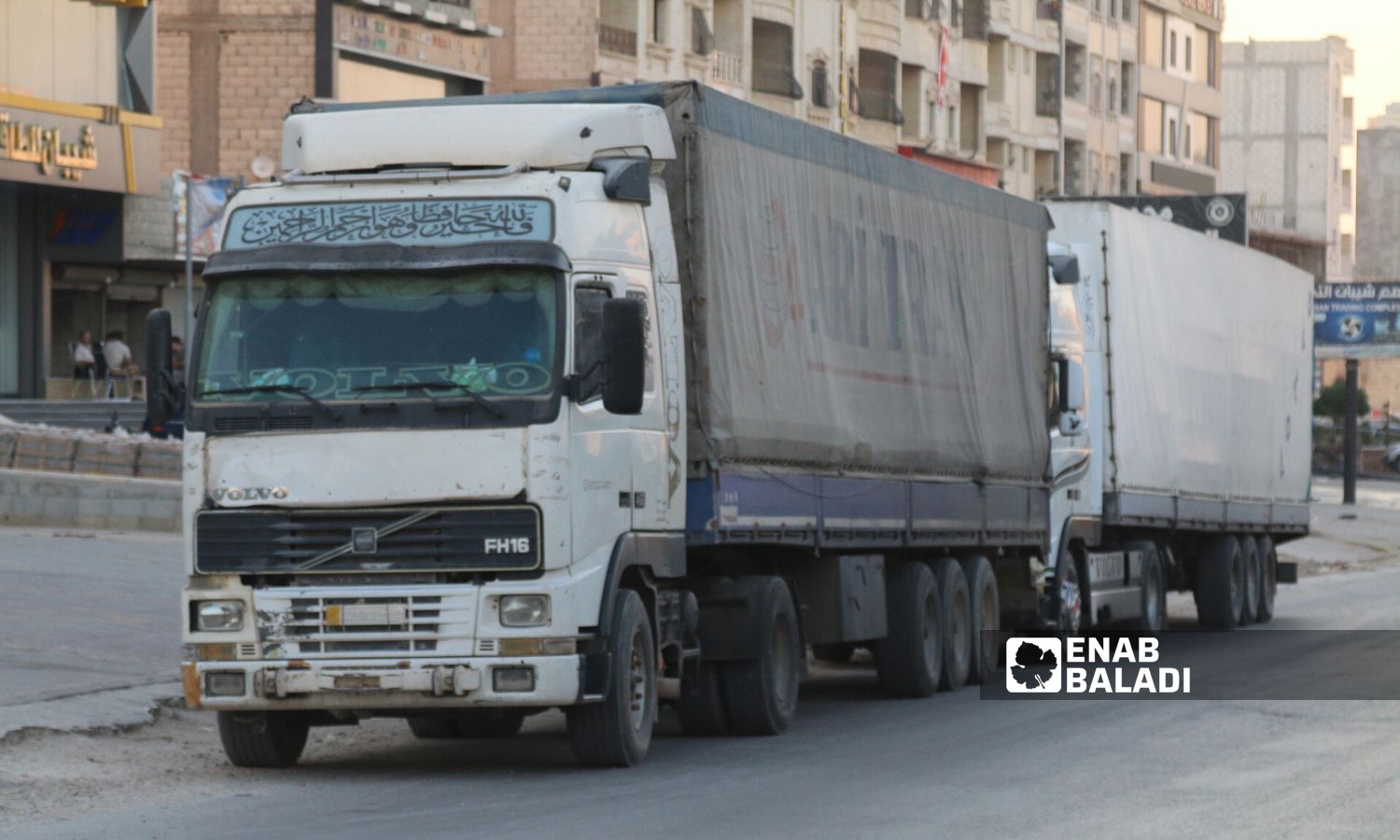



Azaz – Dayan Junpaz
The movement of Syrian trucks in the northern and eastern countryside of Aleppo has resumed its usual activity, transporting goods from the border crossings with Turkey to northern Syria after nearly four years of almost complete cessation.
The movement resumed after Turkish trucks stopped their journeys to Syria following anger and protests in northern Syria over acts of violence against Syrian refugees in the Turkish city of Kayseri on June 30th.
This return has created job opportunities for hundreds of Syrian trucks and hundreds of workers in an area suffering from unemployment and deteriorating living and economic conditions.
Hassan Qabso, the media office official at the Bab al-Salama crossing in Azaz, northern Aleppo countryside, told Enab Baladi that the Turkish trucks were subjected to attacks and vandalism by some protesters, which raised great fears among the drivers that the attacks would be repeated during their entry into Syrian territory.
He added that Turkish drivers now prefer not to enter Syrian territory to avoid similar attacks, pointing out that the new mechanism only allows Turkish trucks to enter Syrian territory through official border crossings and head directly to the customs-controlled crossing areas.
After that, Syrian traders ask Syrian truck drivers to transport the goods inside, and the cargo is unloaded from the Turkish truck to the Syrian truck by daily workers.
Many traders in the area rely on Turkish trucks to transport goods directly from factories in Turkey to warehouses in areas controlled by the Syrian Interim Government (SIG) in northern and eastern rural Aleppo, a choice that is considered less costly for them.
This increasing reliance on Turkish trucks led to a decline in the work of Syrian trucks and increased unemployment rates among Syrian workers, according to the head of the drivers’ union, Abdo Assaf.
Since 2019, the administration of the crossing has allowed Turkish commercial trucks loaded with goods to enter Syrian territory, allowing them to transport and exchange goods away from the crossing areas on the Syrian side, which deprived Syrian vehicles of work.
Syrian truck drivers organized several protests and demonstrations in recent months in the cities and towns of rural Aleppo, expressing their deep dissatisfaction with the restrictions imposed on their vehicle movements and demanding the cancellation of decisions that negatively affected their lives and their families’ lives.
The demands did not lead to positive results despite receiving many promises, according to the drivers.
The head of the drivers’ union, Abdo Assaf, told Enab Baladi that the return of Syrian truck movements to their activity has enabled 700 Syrian trucks and more than 500 workers to resume work in the area after an almost four-year halt.
He mentioned that this step reflected a noticeable improvement in increasing job opportunities for drivers and daily workers.
Assaf pointed out that the drivers’ union was not working effectively and made promises to activate the union’s role office in the coming days, which will contribute to organizing the work movement and the performance of drivers uniformly, ensuring that each driver works in his role with equal opportunities.
The border crossings between northern rural Aleppo and Turkey provide job opportunities for hundreds of workers in the field of loading and unloading commercial goods exchanged through them, as well as for workers in the field of maintenance and selling the necessary parts for truck repairs.
Mahmoud Hilal, a truck driver, expressed his joy at the return of work to Syrian trucks.
He told Enab Baladi that work on trucks was very limited previously, as the shipments he transported did not exceed two or three in previous months, limited to internal transport within the region.
With the resumption of truck movements from the crossing areas, he can now work daily and effectively by heading to the crossing to transport several shipments as needed, which has contributed to his ability to meet his family’s needs better and improve their living conditions.
Hilal earns 450 Turkish liras for each shipment, while daily workers earn 800 Turkish liras for unloading and loading goods from the Turkish truck to the Syrian one.
The northern Aleppo countryside is linked to Turkey by four official crossings supervised by the Ministry of Finance in the Interim Government: Jarablus, al-Rai, Bab al-Salama, and al-Hamam.
if you think the article contain wrong information or you have additional details Send Correction